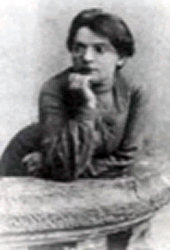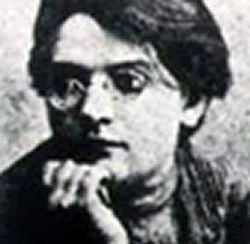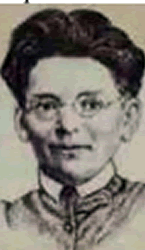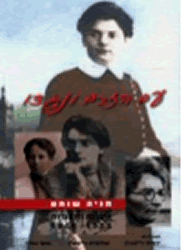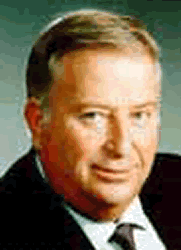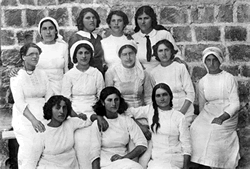#shct-1:
Manya Shochat (Mania Shohat)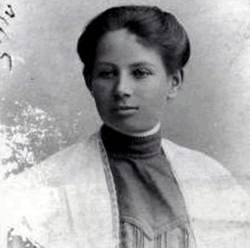
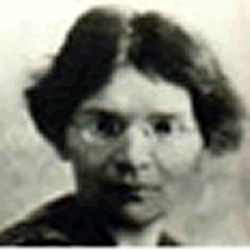
Manya Shochat (Born near Grodno in 1880*; Died 1961) was the "mother" of the Kibbutz movement and collective settlement. She was born as Manya Wilbushewitch in Belorussia to middle-class Russian Jewish parents. As a young adult, she went to work in her brother's factory in Minsk to learn about working class conditions. She was imprisoned because of her contacts with revolutionaries in 1899. There she was indoctrinated by Zubatov, the head of the Tsarist Secret Police in Moscow. Zubatov conceived a plan that fit with Shochat's ideological notions, through which workers would form "tame" organizations that would work for reform rather than for overthrow of the government. She was persuaded that this would also help achieve rights for Jews. She founded the Jewish Independent Labor Party. The party was successful in leading strikes because the secret police supported it, but was loathed by the Bund and other Jewish socialist groups. The party collapsed in 1903 following the Kishinev pogrom. At a loss following the collapse of her ideas, she accepted an invitation from her brother Nachum, who was the founder of the Shemen soap factory, to visit the land of Israel in 1904. Anticipating Arthur Ruppin, she understood that the model of plantation settlement where Jewish owners employed Arab workers, which favored by the Baron Rothschild, could never be the basis for Jewish national life. She concluded that only collective agricultural settlement could produce Jewish workers and farmers who would be the basis for building a Jewish homeland. She returned in 1907 to help establish the country’s first ideologically based cooperative at Sejera, which later became the basis of the first Kibbutz. In 1908, with Israel Shochat, she helped found the Hashomer guard organization, which evolved into the basis of Jewish self-defense. She later married Israel Shochat and had two children. In World War I, the Turks deported the Shochats and others who were not Turkish citizens to Bursa, in Turkey. They returned in 1919, after attending the Poalei Tziyon convention in Stockholm. She was active in the G'dud Ha'avoda. In 1930, Manya Shochat was among the founders of the League for Arab-Jewish Friendship. With Rahel Yanaait she traveled to the United States to raise money and organize Aliya. In 1948 she joined the MAPAM party. * Some sources give her date of birth as 1879.
See Also:
More Israeli and Zionist BiographiesThe Encyclopedia and Dictionary of Zionism and Israel
By Chaviva Frank;
Born Manya Wilbushevitz in 1879 in the town of Lososna near the city of Grodno in Russia to an unusual Jewish family. Her grandparents lived like gentiles making a very good living as suppliers to the Russian army. Her father, on the other hand, raised her with the spirit of Jewish traditional life. He was a deeply spiritual man and this left an imprint on Manya.
Manya grew up in the turbulent years of Russian political and ideological turmoil. At this time it was not uncommon for a worker to have to toil between 12 to 14 hours for his meager wages. It was also the time of the Jewish secular movements who also had their answers to end the Jewish plight. Manya left home at an early age to work in a sweatshop because she wanted to experience the plight of the common man.
Most of the idealists at the time were revolutionaries who believed that the workers salvation could only come through the overthrow of the Russian government. Manya thought differently, she felt that the solution mainly was in the education and organization of the workers in non political (meaning not anti government) union activity.
Amongst the groups current at that time were the Bund which believed in the alleviation of the Jewish problem through better material conditions, together with socialism, but were anti Zionist although quite pro-Jewish culture. At the same time there existed the beginnings of the Zionist movements that called for the Jews to leave Russia and immigrate to Israel. Manya had her own ideas and did not enter into Zionist or even Jewish identity thinking until later in her life, as we shall see.
During a crack down on the Russian activists, she was arrested and imprisoned. Because of her simplistic and dedicated belief in the betterment of the Russian proletariat who was impressed with her sincerity, she became friendly with her interrogator, Zubatov, a high Russian official, who agreed with her philosophy. He tried to help her. Eventually she was released and she tried to bring her philosophic ideas into action, but after another cruel crack down by the Russian authorities she felt force was a necessity and she became a gun smuggler, purchasing and smuggling guns to defend her group.
During this period, she had hid some guns in a house and later became aware that the Russian police were watching the house. Suddenly a young man came to the door seeking refuge from the police. Manya let him in but during the course of their conversation, she became convinced that he was sent by the Russian secret police to find out about her activities. She pulled out a small handgun that had a silencer on it and killed him. She loaded his body into a trunk and sent it to a far destination. From that point on, whenever anyone was killed mysteriously, she was suspected of doing it.
In 1903, the infamous pogroms of Kishinev erupted and the Jews of Russia suffered a devastating blow. Manya began a turning point in her life. She and her comrades met and decided to dedicate themselves to helping the Jews. The pogroms had made a fundamental change in Manya, now she was completely dedicated to the redemption of her people. They decided on a plan to assassinate the Russian minister of the interior, Plehve, who hated the revolutionaries and Jews. With a complicated plan, Manya was sent to Berlin to raise funds. While she was there, the Russian police uncovered the plot; most of Manya's friends were arrested, tortured and executed.
With this bad news, a chapter in her life closed and a new one began. Not able to return to Russia, depressed with the loss of her comrades, and the failure of their plot, she decided to visit her brother, Nachum, in Israel. Her brother was the founder of the famous Shemen oil and soap factory in Haifa. With her brother and several newly found friends they made an extensive tour of the country meditating on the future of the land and imbibing in the rich biblical past. Manya became a new person. No longer concerned with the Russian revolution, but with the development of the Land of Israel and the betterment of the Jewish workers.
At this point it is important to mention that Baron Rothchild had invested much money in purchasing lands in Israel to bring agriculture back to a barren land. Each plot of land was administered by a Jew. This Jewish administrator hired Arab workers to work the land. To protect the small farming estate, he hired more Arabs to guard the property. The immigrant Jews, on the other had could not compete economically with the Arabs since the Arabs lived in nearby villages in small houses. They also had a small amount of land to plant for their own crop and several small animals to augment the small wages paid. To make matters worse, the hiring of Arabs inspired other Arabs searching for better wages to come from neighboring lands to Israel.
The Jews, on the other hand, had no homes, the Jewish Agency had many years to go until it was created. The Jews lived together, with many people sharing one small room. They had little income to purchase their daily bread.
In addition, she noted that the agricultural farms never made a profit. There was no incentive for the Arabs to work hard to achieve more crops. The administrators were accustomed to never producing a profit and relied on more funding from Baron Rothchild.
Manya reasoned out the idea of a communal farming experiment, utilizing the Jewish labor, training them to work the field by day and to be their own guards at night. Instead of having Arabs work the land, and employing Arabs to guard the land, have Jews farmers work in a co-operative that would include both the tilling of the land and the guarding of it.
She approached several of Baron Rothchild's administrators, but only one thought that her ideas had any merit. She went to see Baron Rothchild in France and convinced him to allow a trial on one of the existing farms. This experiment was a success. Manya proved that Jewish laborers had the ability and the incentive to make the Land of Israel bloom plus the tenacity to stand guard over their own fields against Arab bandit gangs.
Soon Manya and her friends formed the "HaShomer" group, a secret group dedicated to the armed guard of the settlements. They gave birth to the first communal settlement, called Sejera, later changed to Ilaniya, located between Tiberias and Natzeret. Afterwards, Degania was organized and started. The communal agricultural settlement became a success due to the backbreaking labor and the self sacrifice of those brave and courageous settlers. Manya, herself participated in the physical toil as well as the guard duties, in addition to her administrative role. 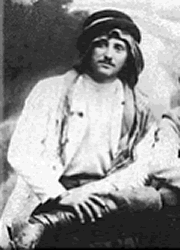
The Arabs were not fond of these settlements for they took away their livelihood. Manya tried to promote peaceful cooperation with the indigenous Arabs but try though she may, with small success, peace was never a viable substance.
During this period she met her husband Israel Shochat, a dashing and idealistic man who shared the same philosophy as Manya (he was 9 years younger then her). They were married in 1908 and had two children, Anna and Gady. At one point Israel, together with David Ben Gurion and Yitzhak Ben Zvi (a future President of the State of Israel) studied Turkish Law in Turkey. Since Turkey was the administrative government in Israel, knowledge of Turkish law was fundamental.
Manya spend all of her years in service to the communal good. She took upon herself special tasks, such as fund raising, smuggling in guns in to protect the settlements. She was successful in both. She set an example to all through her hard work in menial chore, guarding, and administrating the co-operatives.
At one time Manya and her husband were arrested by the Turks and exiled to Brusa, Turkey. They spent several years there until they were able to leave. Their daughter Anna was born there during their exile.
After World War I, the British ousted theTurks and began limiting Jewish immigration. Manya worked to help in smuggling Jews in from the Diaspora. She helped found Tel Chai in the upper Galilee, which became a center for importing smuggled weapons from Lebanon.
Manya took active part in every national cause. Giving of herself 100% to the needs of her friends. In the eyes of the nation and in the eyes of her friends she set the example of a self-giving and courageous woman.
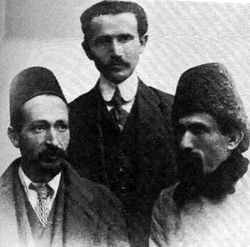
Yitzhak ben Zvi, David ben Gurion, and Yitzhak Shochet in Turkey
Unfortunately, everything has its price. Manya's marriage was not a happy one. Her husband, Israel, became a womanizer. They separated, Manya spending her time in the communes, and Israel living his life with his various female friends in Tel Aviv.
Even her children did not acknowledge her. Her daughter Anna told reporters that she never had a relationship with her parents. She quipped to David Ben Gurion, who asked about her famous and courageous mother, that she was an orphan. Raised with the knowledge that the Land was first and foremost, she never forgave her mother and father for their lack of attention. Their son, Gady ( Gidon) , choose to end his own life in 1967. Gady was the father of Alona (passed away in 2005, the ex wife of singer; Arik Einstein) Her two daughters married the sons of Uri Zohar.
Perhaps with out Manya's contribution, the Land of Israel would have had to find another venue to redeem itself. She could be rightly called the mother of Israel's kibbutz's, if not the mother of her own children.
~~~~~~~
From the June 2003 Edition of the Jewish Magazine
Brandeis President Jehuda Reinharz and his wife, Shulamit, founding director of the Women’s Studies Research Center and Hadassah-Brandeis Institute, are co-editors of a new book titled A Fearless Visionary in the Land of Israel: The Letters of Manya Shochat (or Mania Shohat) 1906-1960. They edited the work with Motti Golani. The book was published in Hebrew by Yad Ben-Zvi Press, Jerusalem.
Known as the “mother” of the Kibbutz movement and collective settlement, Shochat (1880-1961) was a well-known Zionist activist who founded the Jewish Independent Labor Party. Biographies depict her as a genuinely altruistic, tireless crusader for the good of the community at large, and as someone who was not averse to concealing and using firearms in pursuit of her cause.
In an article in The Jewish Magazine, Chaviva Frank characterized Shochat as being “Today almost forgotten, but once a legend.” She said Sochat’s life “resembled an imaginative Hollywood soap opera, except that it was real!”
my.brandeis.edu/news/item?ne ws_item_id=104254...
Production Year: 1988
Length in Min: 46
Versions: Hebrew, English
The life of an extraordinary pioneer of the “Second Aliya,” (second wave of immigration), active and very involved in both the Russian and Zionist revolutions. The wife of Israel Shochat - one of the founders of the “HaShomer” (the guardian) group and kibbutz Kfar Giladi in upper Galilee. Her activities of many years in Czarist Russia and later in the defense and leadership of the Jewish settlers of Palestine, became legendary already in her lifetime and only increased after her death. The film examines the reason for this, with the aid of reconstructed dramatic insets, interviews, stills and documentary material.
Director: Orna Ben Dor-Niv
Producer: Yigal Efrati, David Schuetz
To read in Hebrew go to
http://lib.cet.ac.il/Pages/sub.asp?kwd=5924
#shct-2:Shochat, Israel (1886-1961)
Pioneer and Founder of HaShomer Israel Shochat was born in Byelorussia to a family of landowners. He received a traditional Jewish education and then went to Warsaw to study commerce. Although his parents urged him to go to Germany to study agronomy, Shochat, who was a member of Poalei Zion, decided instead to move to Eretz Yisrael, arriving in 1904. He worked first in the orchards of Petach Tikva and the winery in Rishon LeZion, but poor health forced him to replace manual labor with desk jobs. In 1908 he married Mania Wilbushewitch, six years his junior, who shared many of his ideas on Jewish settlement. From his arrival in Eretz Yisrael, Shochat argued for the need for Jewish defense. Jewish settlers whose property was generally guarded by Arabs, he insisted, ought to rely on Jewish defense, rather than Arab protection. In 1906 Shochat organized the first group of Jewish guards in Zikhron Yaakov, and the following year he established Bar Giora, a secret society that introduced Jewish watchmen into settlements, beginning in the Galilee. In 1909, the society expanded and became HaShomer, and sent Jewish watchmen to settlements all over the Yishuv. Shochat was named head of HaShomer from its inception until its dissolution in 1920. In addition to Jewish defense, Shochat was a staunch supporter of the idea of Jewish labor. Influenced by ideas of Communist Russia, he also hoped to establish a Labor Legion, which would join the ideals of labor, communal life, and discipline, but the idea was met with insufficient enthusiasm to materialize. In 1912, Shochat, along with David Ben Gurion and Yitzhak Ben Zvi, went to Constantinople to study law. Returning to Eretz Yisrael during World War I , he suggested the establishment of a Jewish brigade to help the Turks defend the country. The Turkish authorities, however, were suspicious of the idea, and Shochat was deported to Turkey. He remained abroad for the duration of the war, attending the Poalei Zion convention in Stockholm and then returning to Eretz Yisrael. Following the war, Shochat was active in various labor organizations and the Ahdut HaAvodah party, as well as the Haganah. HaShomer at this time was pressured to be subsumed by the Haganah, but following disputes with Haganah leadership over the organization's structure, Shochat resigned from its command. Shochat attempted to form other defense societies, but with little support. Convinced that the British were the Jews' primary enemy, he traveled to Moscow in 1925 to enlist Soviet support against the British and establish ties between his defense group and the Soviet secret service. This project, too, amounted to nil. Shochat's various activities aroused much controversy in the Yishuv establishment, and he was removed from positions of authority in Yishuv organizations. He continued to work as a lawyer, and later defended Haganah prisoners during the Mandate. Following the establishment of the State, he served as director of the Police Department.
Manya Shochat
By Chaviva Frank Today almost forgotten, but once a legend, the well known Zionist activist's life resembled an imaginative Hollywood soap opera, except that it was real!
Born Manya Wilbushevitz in 1879 in the town of Lososna near the city of Grodno in Russia/ Belarus to Jewish family. Her grandparents lived like well-off gentiles making a very good living as suppliers to the Russian army. Her father, on the other hand, raised her with the spirit of Jewish traditional life. He was a deeply spiritual man and this left an imprint on Manya.
Manya grew up in the turbulent years of Russian social and ideological turmoil. At this time it was not uncommon for a worker to have to toil between 12 to 14 hours for his meager wages. It was also the time of the Jewish secular movements who wanted to end the Jewish plight. Manya left home at an early age to work in a sweatshop because she wanted to experience the plight of the common man.
Most of the idealists at the time were revolutionaries and believed that the workers salvation could only come through the overthrow of the Russian government. Manya thought differently, she felt that the solution mainly was in the education and organization of the workers in non political (meaning not anti government) union activity.
Amongst the groups current at that time were the Bund which believed in the alleviation of the Jewish problem through better material conditions, together with socialism, but were anti Zionist although quite pro-Jewish culture. At the same time there existed the beginnings of the Zionist movements that called for the Jews to leave Russia and immigrate to Israel. Manya had her own ideas and did not join the Zionists until later in her life.
During a crack down on the Russian activists, she was arrested and imprisoned. Because of her simplistic and dedicated belief in the betterment of the Russian proletariat who was impressed with her sincerity, she became friendly with her interrogator, Zubatov, a high Russian official, who agreed with her philosophy. He tried to help her. Eventually she was released and she tried to bring her philosophic ideas into action, but after another cruel crack down by the Russian authorities she felt force was a necessity and she became a gun smuggler, purchasing and smuggling guns to defend her group.
During this period, she had hid some guns in a house and later became aware that the Russian police were watching the house. Suddenly a young man came to the door seeking refuge from the police. Manya let him in but during the course of their conversation, she became convinced that he was sent by the Russian secret police to find out about her activities. She pulled out a small handgun that had a silencer on it and killed him. She loaded his body into a trunk and sent it to a far destination. From that point on, whenever anyone was killed mysteriously, she was suspected of doing it.
In 1903, the infamous pogroms of Kishinev erupted and the Jews of Russia suffered a devastating blow. Manya began a turning point in her life. She and her comrades met and decided to dedicate themselves to helping the Jews. The pogroms had made a fundamental change in Manya, now she was completely dedicated to the redemption of her people. They decided on a plan to assassinate the Russian minister of the interior, Plehve, who hated the revolutionaries and Jews. With a complicated plan, Manya was sent to Berlin to raise funds. While she was there, the Russian police uncovered the plot; most of Manya's friends were arrested, tortured and executed.
With this bad news, a chapter in her life closed and a new one began. Not able to return to Russia, depressed with the loss of her comrades, and the failure of their plot, she decided to visit her brother, Nachum, in Israel. Her brother was the founder of the famous Shemen oil and soap factory in Haifa. With her brother and several newly found friends they made an extensive tour of the country meditating on the future of the land and imbibing in the rich biblical past. Manya became a new person. No longer concerned with the Russian revolution, but with the development of the Land of Israel and the betterment of the Jewish workers.
Baron Rothchild purchased lands in Israel to bring agriculture back to a barren land. Each plot of land was administered by a Jew. This Jewish administrator hired Arab workers to work the land. To protect the small farming, estate he hired more Arabs to guard the property. The immigrant Jews, on the other had could not compete economically with the Arabs since the Arabs lived in nearby villages in small houses. They also had a small amount of land to plant for their own crop and several small animals to augment the small wages paid. To make matters worse, the hiring of Arabs inspired other Arabs searching for better wages to come from neighboring lands to Israel.
The Jews, on the other hand, had no homes, they immigrated, but there was none to help them; the Jewish Agency had many years to go until it was created. The Jews lived together, with many people sharing one small room. They had little income to purchase their daily bread.
In addition, she noted that the agricultural farms never maked a profit. There was no incentive for the Arabs to work hard to achieve more crops. The administrators were accustomed to never producing a profit and relied on more funding from Baron Rothchild.
Manya reasoned out the idea of a communal farming experiment, utilizing the Jewish labor, training them to work the field by day and to be their own guards at night. Instead of having Arabs work the land, and employing Arabs to guard the land, have Jews farmers work in a co-operative that would include both the tilling of the land and the guarding of it.
She approached several of Baron Rothchild's administrators, but only one thought that the idea had any merit. She went to see Baron Rothchild in France and convinced him to allow a trial on one of the existing farms. This experiment was a success. Manya proved that Jewish laborers had the ability and the incentive to make the Land of Israel bloom plus the tenacity to stand guard over their own fields against Arab bandit gangs.
Soon Manya and her friends formed the "HaShomer" group, a secret group dedicated to the armed guard of the settlements. They gave birth to the first communal settlement, called Sejera, later changed to Ilaniya, located between Tiberias and Natzeret. Afterwards, Degania was organized and started. The communal agricultural settlement became a success due to the backbreaking labor and the self sacrifice of those brave and courageous settlers. Manya, herself participated in the physical toil as well as the guard duties, in addition to her administrative role.
The Arabs were not fond of these settlements for they took away their livelihood. Manya tried to promote peaceful cooperation with the indigenous Arabs but try though she may, with small success, peace was never a viable substance.
During this period she met her husband Israel Shochat, a dashing and idealistic man who shared the same philosophy as Manya. They were married in 1908 and had two children, Anna and Geda. At one point Israel went together with David Ben Gurion and Yitzhak Ben Zvi (a future President of the State of Israel) to study Turkish Law in Turkey. Since Turkey was the administrative government in Israel, knowledge of Turkish law was fundamental.
Manya spend all of her years in service to the communal good. She took upon herself special task, such as fund raising, smuggling in guns in to protect the settlements. She was successful in both. She set an example to all through her hard work in menial chore, guarding, and administrating the co-operatives.
At one time Manya and her husband were arrested by the Turks and exiled to Brusa, Turkey. They spent several years there until they were able to leave. Their daughter Anna was born there during their exile.
After World War I, the British ousted theTurks and began limiting Jewish immigration. Manya worked to help in smuggling Jews in from the Diaspora. She helped found Tel Chai in the upper Galilee, which became a center for importing smuggled weapons from Lebanon.
In every national cause, Manya was active. Giving of herself 100% to the needs of her friends. In the eyes of the nation and in the eyes of her friends she set the example of a self-giving and courageous woman.
Unfortunately, everything has its price. Manya's marriage was not a happy one. Her husband, Israel, became a womanizer. They separated, Manya spending her time in the communes, and Israel living his life with his various female friends in Tel Aviv.
Even her children did not acknowledge her. Her daughter Anna told reporters that she never had a relationship with her parents. She quipped to David Ben Gurion, who asked about her famous and courageous mother, that she was an orphan. Raised with the knowledge that the Land was first and foremost, she never forgave her mother and father for their lack of attention. Their son, Geda, choose to end his own life.
Perhaps with out Manya's contribution, the Land of Israel would had to find another venue to redeem itself. She could be rightly called the mother of Israel's kibbutz's, if not the mother of her own children.
Avraham Shochat, a construction engineer by profession, was born in 1936 in Tel Aviv.Shochat was a paratrooper in the Israel Defense Forces (IDF), and has served as a branch director of Solel Boneh (the construction company of the Histadrut, Israel's General Federation of Labour) and a board member of Israel Aircraft Industries.He was one of the founders of the city of Arad, and its mayor for more than two decades (1967-89). He served as the chairman of the first citizens' committee in Arad, Chairman of the Development Towns Council, and Deputy Chairman of the Union of Local Authorities.Shochat became a Member of Knesset in 1988, serving as the Chairman of the Committee on Economy and later as Chairman of the Finance Committee.From 1992-1996 he served as Minister of Finance. In July 1999 Shochat was again appointed Minister of Finance. In August 2000 he was also assigned the National Infrastructures portfolio. He is married and has three children.Source: Israeli Ministry of Foreign Affairs
Dr. Yigal Shochat, a former fighter pilot and now a physician, calls on soldiers to refuse to serve in the territories and recommends that pilots refuse to bomb Palestinian cities. Following are some remarks he made during a debate on war crimes and security in Israel
Red line, Green Line, black flagBy Yigal Shochat
The truth is that I don't yet have a fully formed opinion on the subject of sweeping refusal to serve in the IDF. I am in favor of the state, in favor of preserving its security, in favor of defending the state within its borders, and also in favor of the war against the terrorism - local and international - that threatens Israel.
On the other hand, though, I cannot abide the naturalness with which the occupation is continuing; the fact that one generation after another of soldiers is serving the occupation and that these soldiers are the ones who effectively give the successive governments the power to hold onto the territories and the settlements and to suppress the Palestinian population. Therefore, I find myself on the horns of a large dilemma. In the meantime, I have resolved it, for myself, by deciding that I am in favor of refusal to serve in the territories but not refusal to serve altogether. I know that this is a somewhat hypocritical position, because sometimes the soldier who is posted at General Staff headquarters can do more injustice than a soldier at a roadblock.
Still, I think that refusing to serve in the occupied territories sends a sharper political and moral message. It says that you are ready to guard your country and fight for it, but that you are not willing to suppress another people indefinitely, when the security benefit for Israel is negative. In fact, serving in the occupied territories undermines the country's security while contributing to the security of the settlers. On that subject, I think we have across-the-board agreement by now.
In the case of pilots - pilots of warplanes, helicopter pilots, pilots in general - it makes no sense to talk about refusing to serve across the 1967 Green Line. Pilots do not serve at the place to which they are posted. In effect, they have to decide anew every day, and sometimes every hour, which operations are moral and legal and which are not. I am not naive: I am well aware that any pilot who will refuse to bomb Nablus or Ramallah once or twice will thereby bring his career to an end - and we are talking about a career. To fly is a way of life and a profession. It is never just the draft and reserve duty, which you do in order to get it over with and get back home in one piece. So, in the case of pilots, I think we need to expand the concept of the "black flag."
[Shochat is referring to the phrase used by Judge Binyamin Halevy in 1958 in the trial of the members of the Border Police who on October 29, 1956, shot dead 43 civilians - men and women - from the Arab village of Kafr Qasem in Israel, who were returning home from the fields and were unaware that their village and others in the area had been placed under curfew ahead of the Sinai War, which began that day. "A black flag flies over a flagrantly illegal order," Halevy stated.]
In my opinion, pilots need to examine closely the order they get, ask a lot of questions about the goal, and refuse to obey any order they consider immoral. I am afraid that such questions do not occupy them, rather they compete among themselves over who will be assigned the next mission to liquidate someone in the center of Nablus, on the main street, or who will get to drop a bomb on a building in Ramallah. They probably return to the squadron happy when they score a bull's-eye and are sorry, to some extent, if civilians are killed. I remember this from my own experience. People want to excel in what they do, and they want action. That's why they are pilots in the first place.
I think that F-16 pilots should refuse to bomb Palestinian cities. They have to think about what a bombing operation would be like in the city they live in. Let's say that [Palestinian leader Yasser] Arafat were to decide to level the police station on Dizengoff Boulevard using a warplane. (Let's say he had a warplane.) If Arafat were to conclude that this is how he could convince [Prime Minister Ariel] Sharon to withdraw from the territories, would we accept a bombing operation in the center of the city as a legitimate military act? After all, we call even an operation against an IDF outpost, like the one last week at Kerem Shalom, a "terrorist" attack.
I can imagine what it was like in Ramallah when an F-16 bombed the police station there. I am not talking about the civilians who were killed there - cooks from Gaza, not troops. I am talking about bombing a densely populated city. I am talking about liquidating people on the main street, from a helicopter, with three passersby also killed. It's impossible today to say that this was "collateral damage," that we didn't intend to kill civilians, because when a plane bombs a populated city, you take into account that civilians could get killed. Even in precision bombing. So I view this as the deliberate killing of civilians - a war crime. We have seen in the past few months what smart bombs can do, both here and in Afghanistan.
I think that the goal is not important enough to pay that price, especially when we are confronting not an army but civilians. And more especially when we are wrong. Very wrong. In my view, neither the larger goal of this fighting is legitimate - because the occupation is not legitimate - nor the small goal of destroying a police station in order to pressure Arafat into stopping the use of terrorism. That, too, is not legitimate.
In 1996, I did not accept the legitimacy of "Operation Grapes of Wrath," where the purpose was to force Lebanese civilians to flee by bombing them, thereby pressuring the government in Beirut to take action against Hezbollah. But it is not only pilots who are responsible for war crimes. I think that, in the final analysis, the pilots may be less responsible than other soldiers. I think that every driver of an army bulldozer has to refuse to obey an order to demolish homes with the aim of exposing an area for the convenience of the IDF.
I read this week what the head of the Civil Administration, Brigadier General Dov Tzadka, said about the authorizations he gives to demolish houses and groves, and how the army then goes hyperactive and levels the area he authorized twice. By what right does he approve such an operation in the first place? I am constantly dumbfounded at how these people get up every morning and go to work: after all, we're not talking about kids of draft age, this is a brigadier general. What does he say to himself at the end of the day? "Today I authorized the uprooting of 50 dunams [12.5 acres] of strawberry fields?" What for? To preserve the country's security?
I saw that this Brigadier General Tzadka is now worried that he may end up at the war crimes tribunal in The Hague, because he knows full well what he did. But how can you both know and do? I think that to demolish civilian homes only because they are obstructing someone's field of vision constitutes a flagrantly immoral military act. I am not a legal expert and so I don't know what is legal and what isn't, but I assume that this is illegal as well as immoral. I know that the question of when the black flag flies over an order is a wholly personal one. One can't wait for the court to declare a certain operation flagrantly illegal, nor should one wait, because then it becomes a retroactive matter, as in the case of Ehud Yatom [who, according to the High Court of Justice, took part in the killing of two captured terrorists at the order of the head of the Shin Bet security service in 1984].
There are some people who never see a black flag, not even when it involves the murder of an Arab who is bound. There are people who only see a black flag when they get old, like me, because when I was a young pilot, I wasn't selective. I did what I was told to do. I am in favor of a broader use of the concept of the black flag, which means to refuse to obey an order that in your personal opinion is flagrantly illegal. But I know that draft-age soldiers, and even people in the career army, will not make much use of it. When you're inside, you see things differently.
I think also that to stand at a roadblock and make a selection as to who will be allowed to proceed to a hospital or to a maternity ward and who will not, is also flagrantly illegal. Therefore, I think that every soldier who is assigned to serve at a roadblock should refuse the order and instead go to prison. If only the legality of the selection process at roadblocks were examined in court. I think that those who refuse to serve in the territories should not make do with going to jail; they should try to reach civil courts so that these things will be reviewed and given publicity. Let them go all the way to the High Court of Justice with their refusal. Those who go to jail quietly do not exert an influence.
It is out of the question to allow the army to set up roadblocks at every corner that prevent people from going about their lives, going to work, going to the doctor, and to accept this as though it is a divine decree. That constitutes collective punishment of civilians, which is illegal according to the Geneva Convention. I think that it's a shame that so few people refuse to serve in the territories, but I can't really complain, because I didn't do it either when I should have done it.
Nearly 20 years ago, I paid a visit to the late Prof. Yeshayahu Leibowitz. He asked me then - this was in 1983 - how it was possible that there weren't 500 officers who would refuse to serve in the territories. He said that in his opinion, if there were 500 officers like that, the occupation would end immediately. I think he was right. Soon we will not be able to refer to an "occupation," because being present on the ground for so many years creates a new situation.
People who served in the territories in their compulsory service return as reservists, and their children are also stationed in the same places. The new generation doesn't even know the Palestinians because of the lengthy closure, and to them, the territories are like Lebanon. Apartheid against the Palestinians is practiced by one generation to the next. And not only by the settlers - by all of us. If there are no terrorist attacks, we don't even remember that the Palestinians exist.
I don't know whether every operation I took part in when I was an active fighter pilot was legal or moral. Probably not. Today, friends from that period who bombed targets with me complain to me that I remembered too late to be a bleeding heart and that it's no big deal to talk about refusal to obey orders when I am no longer involved and I will not be the one to go to jail. They say that as long as my promotion in the army was at stake I said nothing, but now that I have nothing to lose I am suddenly a hero. That is all true. I reached political and moral maturity very late.
But I can also say, roughly, that I always bombed military targets. When I bombed civilian neighborhoods, it was during a full-scale war, when planes and tanks and soldiers from both sides were locked in combat, and it was far from sure who would win. In general, in the wars in which I took part, our feeling was that Israel was in an inferior position and that we were fighting for our lives and our home, literally. As to the territories, as to this military struggle against the Palestinians, I simply don't see armies facing off and I don't see a war. In fact, I don't even know which side of the fence I'm on, because I am certainly not on the side of the settlers. What I see is an occupied population that has a few hundred rifles and mortars, which is trying to expel us, while we refuse to go because we have invested a few cents in unnecessary settlements.
I am aware of the arguments against refusal. First of all, they say that in a democracy, it is the role of the elected political level to decide what constitutes a legitimate goal and what does not. I reject that. Precisely in a democracy, it is the right and the duty of every citizen to oppose illegitimate warfare. In totalitarian regimes, people who refuse to serve are shot, while here they are only sent to prison briefly. It is in a democracy that you have the option of not following the herd.
The second argument is that we need more humanists at the roadblocks in order to ease things for the Palestinians and that we must not leave the army to the nut cases on the right. I also deny the importance that is attributed to individual soldiers at a roadblock, because in the course of time, they all become insensitive to suffering. I think that the individual soldier carries the greatest weight when he refuses to serve.
The third argument is that if everyone were to decide which orders to obey, the time will come when the settlers will refuse to evacuate the settlements. To that I say: That's fine with me. For my part, the settlers can refuse to evacuate the settlements and we will do it for them. I, for example, would refuse to demolish the home of a Palestinian with a bulldozer, and at the same time, some soldier-settler would refuse to evacuate a settler family. That's fine with me. The important thing is for soldiers to retain their humanity and realize that they are confronting dilemmas.
In my opinion, all the IDF's operations in the territories are approaching the red line of the black flag. I cannot judge what is legal and what constitutes a war crime. At a time when the Americans kill 7,000 people in an attempt to find one person, it is difficult to talk about morality in war. Since the establishment of the Palestinian Authority, following the Oslo accord, we have begun to treat it as a state even though it is not. That makes it easier for us to attack it with weapons, such as planes and tanks, that are intended for use against armies in war. My feeling is that we have crossed a line, and I am afraid that the day is not far off when we will bomb the Arabs in Israel the way we opened fire on them in the demonstrations of October 2000.
The day is not far off when the Israel Air Force will bomb Umm al-Fahm, in the same way that Saddam Hussein bombed his Kurdish citizens. I don't know if the air force pilots will refuse to obey such an order. There will be someone to persuade them that the operation is logical and essential, that the bombs are smart, that the only targets are city hall and the Islamic movement, and not innocent people. I don't see any great difference between that and bombing Ramallah.haGalil onLine 20-01-
Yigal is married to Orit nee Yarkoni (daughter of Yaffa Yarkoni "the Singer of the Wars." ) Shochat who writes for Kol Ha'ir and Ha'aretz
Everything by Orit Shochat
Articles/Books
Israeli Revenge Forces -- Who Is The Hero? The One Who Refuses To Serve
Article/book #746: Israeli Revenge Forces -- Who Is The Hero? The One Who Refuses To Serve
By: Orit Shochat
Published in: Common Sense, volume 16, issue 4
Date of issue: February 2002
Topics addressed:
Conscientious Objectors in Israel (refuseniks)
Ariel Sharon
Israel: abuses by army/police
Settlements in the West bank and Gaza
Abstract: We are the strong ones, we are the bad ones, we are the occupiers, we are the settlers, we deny them livelihood, freedom of movement, health care, food, water, land, houses, a state, life. He who is willing to serve in an army which deprives civilians of all that, must be made of stone. The commander of the infamous Unit 101 is now Prime Minister, and it is he who dictates to the cabinet a policy of revenge operations, the style of the 1950s. Those who voted for him for Prime Minister, Ariel Sharon, the commander of the ruthless act committed by Israeli soldiers in Kfar Kibiya, must be very pleased with their choice. In October 1953, in the Jordanian village of Kibiya, the IDF (the military, i.e., Israeli Defense Force) avenged the killing of Susan Kenyas and her two children. Unit 101 under the command of Ariel Sharon blew up 45 of the village's homes, killing 69 villagers: men, women, and children. The military insisted that the soldiers presumed the houses empty when they blew them up. But afterwards it was learned that the bodies of those killed were riddled with bullets, and that grenades were thrown into the homes prior to laying the explosives. Sharon's orders to his soldiers were definitively clear: "The objective--attack Kfar Kibiya, conquer, and cause maximum harm to persons and property . . ." Our prime minister-commander of unit 101, praiseworthy for iniquity, continues to design vengeful acts like those of the 1950s, but now as government policy: when no terrorist attacks occur to revenge, the cabinet fabricates excuses for revenge; when there is no excuse, it provokes; when even provocation fails to work, we revenge the assumed intention to murder Jews.
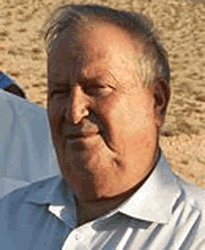
#shct-3
Avraham Shochat
From Wikipedia, the free encyclopedia
Avraham Shochat
Date of birth 14 June 1936 (1936-06-14) (age 72)
Place of birth Tel Aviv, Mandate Palestine
Knesset(s) 11th, 12th, 13th, 14th, 15th, 16th
Party Labour
Former parties Alignment, One Israel
Gov't roles
(current in bold) Minister of Finance
Minister of National Infrastructure
Avraham Shochat (Hebrew: ????? ????, born 14 June 1936) is a former Israeli politician who twice served as Minister of Finance.
[] Background
Shochat was born in Tel Aviv during the Mandate era. After his national service, in which he served as a corporal in the Nahal paratroopers, he attended the Technion, where he gained a BSc in engineering, also being elected chairman of the university's Student Union during his studies.
He moved to the Negev and was one of the founders of the city of Arad in 1962. He worked as branch director of Solel Boneh in Arad and the Dead Sea area and was a member of the Board of Directors of Israel Aircraft Industries and Negev Phosphates.
] Political career
In 1967 Shochat became head of the Arad local council. In addition to his mayoral duties he was also deputy chairman of the Union of Local Authorities, chairman of the Development Towns Committee of the Union of Local Authorities.
In the 1984 Knesset elections he was on the Alignment's Knesset list, but failed to win a seat. However, when Aharon Harel resigned from the Knesset in May 1988, Shochat replaced him. He retained his seat in elections in November that year, and was became chairman of the Finance Committee and the Economic Affairs Committee. After being re-elected in 1992 (by which time the Alignment had become the Labour Party), he was appointed Minister of Finance by Yitzhak Rabin. Although he was re-elected again in 1996, the opposition Likud won the election and Shochat lost his ministerial position.
Following victory for Ehud Barak and One Israel (an alliance of Labour, Meimad and Gesher) in 1999, Shochat was once again appointed Minister of Finance. In October 2000 he was also made Minister of National Infrastructure replacing Eliyahu Swisa after Shas left Barak's coalition. After Ariel Sharon won special elections for Prime Minister in 2001, Shochat left the cabinet. In the 2003 elections he also lost his Knesset seat.
After leaving the Knesset, Shochat was commissioned to produce a report on tuition fees for Israeli university students. His report, published in July 2007, recommended raising fees for Bachelor's degrees by 70% and increasing government funding for higher education by NIS 1.5 billion.[1]
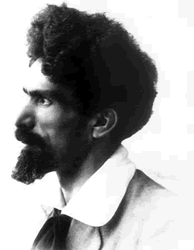
#shct-4
Israel Shochat
From Wikipedia, the free encyclopedia
Israel Shochat (1886-1962) was a founder of and a key figure in "Bar-Giora" and Hashomer, one of the precursors of the IDF. He was married to Manya Shochat.
[] Biography
Israel Shochat was born in 1886, in Liskova, Poland. As a child he had tutors for Hebrew and Russian. At 18 he was involved in a Jewish defence group and in Poalei Zion. He went to Germany to study agronomy but left his studies after only three months and emigrated to Israel with his brother, Eliezer, in 1904. They worked as field hands in the fields and orchirds of Petah Tikva. He moved to Rishon leZion to work in the winery. There Israel met Alexander Zaid and shared with him his radical socialist ideas. Zaid received them enthusiastically and declared "I'm with you, for life or death, let's start as of now!"[1] In Rishon he suffered the first bout of fever, which was to plague him for the remainder of his life.
Israel moved to Jerusalem to persuade the yeshivot leaders to join the efforts to create a national workforce. His attempts failed. To support himself, he shined shoes at Jaffa Gate. As a result of ill-health, he was forced to give up manual labour and worked as Israel Belkind's assistant. He became interested in the Circassians living in Palestine, as an example of how a small minority could preserve it's identity and pride in an often hostile environment. The key for Shochat was that they cultivated their land and protected it with their own hands.
Along with Israel Giladi, Alexander Zaid and Mendel Portugali, he convinced some of the Jewish farmers to let them help with guarding the fields. It was a modest start. Israel represented Poalei Zion in the Zionist Congress of 1907, which took place in the Hague. He was his party's first representative from Palestine. He was unable to present his idea to the assembly and in a private conversation, Menahem Ussishkin told Israel that he was much too young to succeed in achieving the goal of a national defence. Yitzhak Ben-Zvi, a representative from the USA, was receptive and they travelled back to Palestine together, working along the way.
In 1907, Israel was one of the 10 people who, in Yitzhak Ben-Zvi's Jaffa apartment, founded "Bar-Giora", a clandestine organisation which sought to create an armed Jewish force. It took its name from one of the great Jewish rebels against the Romans. He was part of the collective at Sejera and led the watchmen there.
Along with Manya Shochat, Israel was one of the founders of Hashomer. He also founded the Work Legion, an organization meant to do the same thing for agriculture that Hashomer did for security. Being a Russian national, the Turks exiled him from Palestine to Antalya.
After the war, he worked the land in Kfar Giladi, but soon became involved in Gdudei HaAvoda and in organizing the defence of the Galilee.
During the riots of 1921, he took an active part in defending Tel-Aviv and Jaffa.
In the years 1921-26, Israel was on the Vaad Leumi. He was also instrumental in forming Hapoel.
In the 1930s, after a long conflict with the Histadrut, he retired from political life. He died in 1962 and is buried in Kfar Giladi alongside his wife.
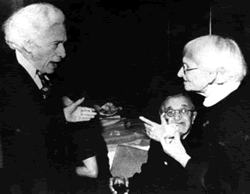
#shct-5
Yisrael Shochat
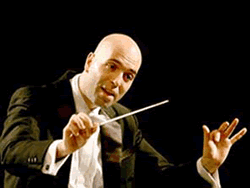
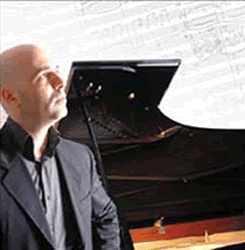
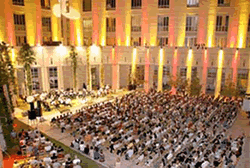
#shct-6:
Gil Shohat
Artistic Director/Chief Conductor - Israel Chamber Orchestra
Head of Music - Israel Festival, Jerusalem
Profile - Israeli Composer and Conductor Gil Shohat - by Helen Kaye
Portrait: le chef l'orchestre et compositeur israelien Gil Shohat
Both at home and abroad, audiences and critics alike regard the youthful Gil Shohat as one of the leading Israeli musicians of his generation. All three of Israel's major newspapers (Yedioth Aharonoth, Ma'ariv and Ha'aretz) have declared Shohat to be "The most important and influential personality in classical music in Israel".
He is the composer of nine large-scale symphonies, ten concertos for various instruments, three operas, various oratorios, cantatas, solo vocal pieces, and dozens of chamber and piano pieces, as well as the performer of more than 80 concerts a year worldwide, both as a conductor and pianist.
Shohat came to local and international attention with his opera Alpha and Omega (2001) - the largest original opera production ever staged in Israel - receiving enthusiastic reviews worldwide. This was followed by the operas Tyre and Jerusalem (2002) and Badenheim (2005); Shohat has also written musical and theater pieces for children, including the musical Max and Moritz (2004). All these compositions have enjoyed world premieres, with most receiving repeat performances throughout Israel as well as Europe.
Shohat's music has been performed by conductors Gary Bertini, John Nelson, Mendi Rodan, Steven Sloane, Alvaro Cassuto, Stanley Sperber, Philippe Entremont, Yuval Zaliouk, Shlomo Mintz, Hermann Max, Micha Damev, Doron Salomon, Jonathan Webb, Peter Bergamin, Gabor Hollerung, Massimo Mercelli, Daniel Reuss, Elias Arizcuren, Nir Kabaretti, and Mats Liljefors. In addition, Shohat regularly performs as a pianist and conducts his own compositions. Orchestras that have performed Shohat's works include the Berlin Symphony, the Rome Opera Orchestra, the Pomereggio Musicale Orchestra of Milan, the Cologne Radio Orchestra, the Bochum Symphony, the St. Petersburg Hermitage Orchestra, the Dohnany Orchestra of Budapest, the Bucharest Philharmonic, the Ensemble Orchestral de Paris, the Bangkok Symphony Orchestra, the Irish Chamber Orchestra, and all major Israeli orchestras - including the Israel Philharmonic Orchestra, the Israel Symphony Orchestra Rishon LeZion, the Haifa Symphony Orchestra, the Raanana Symphonette, the Jerusalem Symphony Orchestra, and the Israel Chamber Orchestra. All these Israeli orchestras have also commissioned orchestral pieces from Shohat. Choirs that have sung Shohat's vocal music include the WDR Koln Choir, the Rheinische Kantorei Choir, the Philharmonia Singers, the Milwaukee Symphony Choir, Cappella Amsterdam, the Philharmonic Choir, the Israeli Opera Choir, the Union Choir, the Kibbutz Choir, the Moran Children's Choir, and the Bat-Kol Children's Choir. His concertos, chamber music and solo pieces have been performed by numerous first-rate soloists, ensembles and singers worldwide.
Gil Shohat has collaborated with EMI/Virgin Classics to record his orchestrations. The Israeli Broadcast Authority made a documentary about his music, with the participation of many leading local artists. Another documentary, focusing on his opera Alpha and Omega, was produced by the French television channel "MUZZIK". The Jerusalem Music Center commissioned, produced, and recorded his 16 Anekdotos Cycle. Israeli Director Michal Kesten produced the film "Omegas," based on Shohat's Alpha and Omega. Additionally, performances of his works have been recorded and broadcast by radio stations around the world, including Israel's "Kol Hamusica", France's "Radio France", Germany's WDR, Italy's RAI, the USA's WFMT and Hong Kong's National Radio.
Shohat's works has also been performed and/or commissioned by the Venice Biennale, the Royal Palace Music Festival in Stockholm, the Cappella Amsterdam, the Hong Kong Academy for the Performing Arts, the Music Festival of Macedonia, the Royal Palace Music Festival (Sweden), the Hermitage Festival, the Perugia Music-Fest, the Emilia Romagna Festival, the Vermont Mozart Festival (USA), the Roque d'Antheron Piano Festival (France), the Ruhr Piano Festival (Germany), the Jewish Music Festival of London, the International Music Festival of Yugoslavia, and the Dominican Republic Philharmonic International Festival. Performances and commissions in Israel include the Israel Festival, the International Chamber Music Festival in Jerusalem, the Upper Galilee Chamber Music Festival, the Keshet Eilon International Master Course for Violinists, Tel Hai International Master Classes for Pianists, and ICO's Classic-Chamber Festival in Eilat. Numerous worldwide ensembles of contemporary music have commissioned and performed his works, such as Conjunto Iberico (Spain), Mussica d'Oggi (Italy), Matisse Ensemble (Italy), and Musica Nova (Israel). Additionally, Shohat has written large-scale theater pieces for the Beit Lessin and Cameri Theaters in Tel Aviv.
Gil Shohat was born in Israel in 1973. He began his musical studies at the age of 7, and by 12 was composing and performing his own piano pieces. Shohat's first orchestral composition - a cantata, The Nightingale and the Rose - was commissioned by the Israel Chamber Orchestra when he was just 18. He is a graduate of the Israel Conservatory of Music, Tel Aviv (1984-1990). He received his first and second degrees (BM, MM) from the Mehta-Buchman School of Music at Tel Aviv University (1991-1995) and holds two post-graduate diplomas (piano and composition) from the Santa Cecilia National Academy in Rome (1995-1997). He pursued advanced studies with Prof. Alexander Goehr of Cambridge University in England (1997-1998). All of his degrees were awarded summa cum laude. Most of Shohat's compositions are published by the CASA RICORDI Editions, which he joined at the age of 23 - the youngest composer in the company's history. His composition teachers included Andre Hadju in Israel and Azio Corghi, Ivan Vandor, and Luciano Berio in Italy. His piano teachers were Rachel Feinstein and Arie Vardi in Israel, Sergio Perticaroli in Italy, and Maria Curcio in England. His conducting teachers were Stanley Sperber and John Nelson.
Gil Shohat has won many prizes and accolades, including the Israel Conservatory Prize (1989), Rubin Israel Music Academy Prize (1993), the Italian Government Grant for Advanced Studies (1995-1996), and the British Council Award (1997). He has been awarded grants by the American-Israel Cultural Foundation (1990-1998), the Bracha Foundation (2001), the Rich Foundation (2001, 2005, 2007), and the Rabinovich Tel Aviv Foundation for the Arts (2001-2007). He received first prize for composition from the Arthur Rubinstein International Society, his work becoming the obligatory piano piece for contestants in the International Arthur Rubinstein Piano Competition (1998). He is a laureate of Israel's Caesarea Edmond Benjamin de Rothschild Foundation (2001). He received the Tel Aviv Prize for the Performing Arts – Rosenblum Prize (2002) and the Israel Theater Prizes for "the most significant event of the year" for his opera Alpha and Omega (2002), as well composer of the year (2004). He won the Prime Minister's Prize for composition (2003). He has received a prize and a commission from the Zfunot Tarbut Foundation for the Promotion of Art and Artists in Israel in 2006-2007. His sponsors include the Safra Group in Switzerland, Motorola Israel, Mr. Murray Pepper (Los Angeles), Mrs. Susan Rose (New York City), and the prestigious Soli Deo Gloria Foundation in Chicago. Gil Shohat is a chosen artist of Israel Cultural Excellence Foundation (IcExcellence) since 2004.
As a pianist, Shohat performs more than 40 concerts a year and has given recitals and solo performances with orchestras in 25 nations, including most European capitals, the Far East, India, and the Americas. In Israel, he performed his first recital at age 12; by age 16 Shohat had performed as a soloist with every major national orchestra, including the Israel Philharmonic. Along with a selection of his peers, Shohat established a group of young piano virtuosi who have undertaken a series of performance "marathons". These have included the complete piano repertoire of Chopin (2002-2004), the complete piano repertoire of Schumann (2004-2006), the complete Scriabin sonatas (2004), major piano works by Rachmaninoff (2006), and the complete partitas by Bach (2007). Shohat has recorded 10 CDs as a pianist with Israel's Helicon and NMC labels.
Gil Shohat is a sought-after lecturer in his country. He teaches at Tel Aviv University (the Mehta School of Music and Cathedra Advanced Studies) and at Israel's Open University ("Ascolot"), where he has developed and taught over 30 courses. In Tel Aviv alone, he collaborates with cultural centers such as the Diaspora Museum, the Zionist Organization of America, the Ayala Zaks House, the Lev and Khen Cinema Chains, the Cinematheque, the Tel Aviv Museum of Art, and the Eretz Israel Museum. He has served as the editor and moderator of the Piano Series of the Chamber Music Center at the Israeli Conservatory of Music.
He is the artistic director of the Lecture-Recital Series which has been held in cities such as Haifa, Caesarea, Ashdod, Jerusalem and Tel Aviv. This series has included full courses on subjects such as: The History of Western Music; Bach's Piano Music; Bach's Oratorios; Requiems from Scarlatti to Penderecki; Haydn Symphonies; Mozart Chamber Music; Mozart Piano Music; Beethoven's Symphonies; Beethoven's Chamber Music; Beethoven's Sonatas; Chamber Music and Lieder by Brahms and Schubert; the Complete Operas by Verdi, Puccini, Wagner and Strauss; Mahler's Complete Symphonies; French Music in the 19th Century; French Impressionist Music; Second and Third Viennese Schools; Schoenberg and his Contemporaries; Music Between the World Wars; Contemporary Music; Contemporary Operas; Post-Serial Music; Electronic Music; and Avant-Garde Jazz Compositions.
Shohat's projects that go beyond the concert-music world include: Shohat-Ptashka Piano Duo Show (Jazz); Shohat-Khan Piano-Tabla Duo (Indian Music); the Vilensky Project (Israeli Folk Music); Pink Floyd's The Wall – a remake production with the Israel Chamber Orchestra, choir and soloists (Rock); and French Chansons with Tilda Rajoan and the Israel Chamber Orchestra.
Starting in the 2005-2006 season, Gil Shohat received an appointment as Musical Director and Chief Conductor of the Israel Chamber Orchestra. With the orchestra Shohat performs more than forty concerts a year as a conductor. Since 2003, he is the Musical Advisor and Head of Music of the world-renowned Israel Festival in Jerusalem. Since 2001, he is the Resident Composer of the Israel Symphony Orchestra Rishon LeZion and the Artistic Director and host of their chamber music series. During his military service (1991-1994), Shohat served as the coordinator and commander of the Israel Defense Forces Chamber Orchestra and ensembles, as well as the official concert pianist of the IDF. In the same period he also served as editor and moderator of a concert series for young artists at the Jerusalem Music Center, and the Presenter of the International Arthur Rubinstein Piano Master Competition (1992 and 1995). He received his first official position as the resident composer of the Israel Chamber Orchestra (1998-2000).
By Orit Shohat
Fri., October 10, 2008 Tishrei 11, 5769
The first husband of my mother, Yaffa Yarkoni, was Yossi Gustin, a
sergeant in the British Army's Jewish Brigade. He was killed in the
war against the Nazis in the battle of the Senio valley in Italy on
March 29, 1945.
I learned about my mother's first marriage by chance. The secret was
kept deep in the drawers of our house, beneath piles of panties and
nylon stockings, in bursting envelopes that felt crispy to the touch,
next to a small vial of perfume, also a souvenir from that first
marriage, which no one was allowed to mention.
When I was 10, my cousin Uri, who was four years older, revealed to me
what he believed to be the absolute truth. I remember his words
exactly, the sentence that unhinged my adolescent world. "You are
already big enough to know," Uri said in an authoritative tone of
voice, "that your father is not your father. Your real father is Yossi
Gustin, who was killed in the Brigade." He made me swear not to tell a
soul.
Advertisement
The search for information about Yossi Gustin was probably my first
reportorial investigation. At the time I didn't know about the
envelopes in the drawer, but I assumed that there was hidden evidence
in the house. I had no idea what the "Brigade" was, and neither did my
cousin, but he promised to find out. I thought "Brigade" was a place
in Israel where a battle had been fought in the War of Independence. I
did not know that the term referred to World War II or that the war in
which Yossi Gustin was killed had ended five years before I was born.
I searched for evidence covertly, waiting for my mother to leave in
order to give a concert and for father to go out and for my little
sisters to stop pestering me and for our nanny not to notice anything.
At the age of 10 it?s hard to find a long stretch of time when you are
unwatched. I had only minutes to poke around in drawers that were
never locked.
Within a few days, I found a silver pendant inside which was a picture
of a handsome, unknown young man. He looked nothing like me. Afterward
I found the envelopes with the love letters from mother to Yossi,
which I read with tears, because I thought they meant mother had
cheated on father. I couldn?t make out the dates. The letters had been
returned to my widowed mother from the battlefield, stamped by the
British Army in English, which also puzzled me. Not knowing English, I
could not read the accompanying documents, one of which was a letter
of condolence from King George. Under the influence of the "Hasamba"
adventure books, I thought I had stumbled on a story of betrayal -
both of father and of the homeland.
Later I discovered the wedding photo of Yossi and my mother: a soldier
in uniform and a girl with a flower stuck in her hair. Standing next
to them was grandmother Malka. From that instant I considered grandma
an accomplice to the crime. Days passed between one search and the
next, and I looked at my mother with mistrust and at my beloved father
with pity. I wondered whether he knew he was not my father.
After about a month of this, I approached my mother and fired all the
artillery I had stored up. I gave her no chance to evade the issue. I
produced documents, and she produced counter-documents that
contradicted what Uri had told me. I would accept no less: birth,
death and marriage certificates, photographs, solid explanations.
Mother said that Father did not allow her to talk about Yossi because
he was jealous, even though he hadn't even met Mother until four years
after Yossi was killed. She said Father would not even agree to her
visiting the British military cemetery in Italy where he was buried.
She made me swear not to talk about him to Father, ever. And I never
did. I asked Mother to let me keep the incriminating photograph one
more day before she hid it again, and I promised not to tell my
sisters the story.
A few years later, my youngest sister came to me, distraught, and told
me the same secret, which she had heard from a girlfriend. By then I
was able to reassure her that her father was also my father. I found
the photograph again and shared with her the little information I had.
I was now in high school and knew something about the Jewish Brigade,
but had no way to find out more about Yossi Gustin. And in fact, his
story no longer interested me so much after it turned out that he was
not my father.
It was only after my father, Shaike Yarkoni, passed away in 1983, that
all the secret pictures and newspaper clippings and letters were
collected into an orderly album, which has sat ever since on the shelf
in mother's living room. Sergeant Yossi Gustin became part of the
family at last. Mother started to talk about him in press interviews,
sang in his memory on the television program "This Is Your Life,"
found that the poem "Uri" was written by Raphael Klatchkin about him,
and that "Wait for Me and I'll Be Back" was the song he sang her, and
afterward she sang it for everyone.
Not until I was older did I begin to be truly sad about Yossi Gustin
and about the love that was severed after seven months of marriage. I
reread the letters that were sent to the front, I learned about
mother's life as a young woman, about how she went with Yossi to hear
Pnina Salzman play Brahms, how as a dancer in Gertrude Kraus? ballet
company she was preoccupied with rehearsals for Mark Lavry's opera
"Dan Hashomer" (Dan the Watchman) in the very week in which Yossi went
off to training camp in Italy. I found out what she ate with him, what
she sang with him and how they named her dog "Gulliver". At nineteen
and a half she was already a widow.
Yossi Gustin was born in 1918, in Luck (or Lutsk), Ukraine, then under
Polish rule, and studied to be a dental technician before immigrating
to Palestine in 1936 as a member of the Gordonia youth movement. He
was one of the founders of Kibbutz Ginegar, in the Jezreel Valley. He
met my mother in Tel Aviv at the opera. Their bond was a love of
music. He became a regular visitor at her single-parent home in Givat
Rambam, where the Tzlil Cafe, managed by Grandma Malka, was located,
in which my mother, her sister Tikva and her little brother Binyamin
performed for a living.
Yossi Gustin married my mother on September 21, 1944, the day after
Winston Churchill announced the establishment of the Jewish Brigade,
and the next day he joined the unit. He told his friends that the
creation of the brigade was the most precious wedding gift he had
received. A few weeks later he was sent to the training base in Italy
and then saw action for 50 days before he was killed. He did not know
what befell his mother, uncles and aunts, sisters and cousins who
remained in Ukraine, but apparently understood. The last time he saw
his mother was on a visit to Luck in 1938.
Two years ago, I got a call from Yossi Weiner, who lives in Hadera; he
told me he was Yossi Gustin's cousin. Until then I had no idea that
anyone from Gustin's family was still alive. Weiner asked me if I had
photographs of his family. He explained that with the passing of the
years he was finding it difficult to remember what his father - who
was murdered in the forests of Ukraine - looked like and was in
desperate need of a photograph. Happily, in my mother's collection of
photos I found a photograph of the Weiner family, taken in the
courtyard of the family home in Ukraine, which Weiner remembered well.
Thanks to the personal book of survival that Weiner wrote, "The
Marathon of Life," I got to know the family and its history.
Yossi Gustin and his cousin Yossi Weiner are now part of our family.
In 1945, after Yossi fell in battle, Grandma Malka changed the
family's name from Abramov to Gustin as an act of commemoration. My
mother's brother had three sons, who live in Venezuela and the United
States, and all three bear the name Gustin. Incidentally, only a year
ago I discovered that the real name is "Gurtin." The spelling was
probably bungled when Yossi arrived in Palestine, but that hardly
makes a difference now.
Orit Shohat is a journalist and a member of the Haaretz editorial board
Hana Meisel Shochat born 25 December 1883, died 1972) was a Jewish agronomist, feminist and Zionist.
Meisel (third from right) with students at her agricultural school in 1912, moshava Kineret
Meisel was born in Grodno in the Russian Empire (today in Belarus),and immigrated to Palestine in 1909, during the Second Aliyah, where she became a noted agronomist, and was a founder of Havat HaAlamot ("the maidens' farm") agricultural school in 1911 (closed in 1917), and the girls' agricultural school at Nahalal (opened in 1929). She studied agriculture and natural science in Odessa, Switzerland and France.
She made considerable contributions to the feminist wing of the Zionist movement. Meisel was a member of Poale Zion and was elected to the Assembly of Representatives.
She was married to Eliezer Shohat, also a well-known figure in the Zionist movement, much like his brother Israel Shochat.
Hana Meisel died at Nahalal in 1972.
Meisel is referenced in Shmuel Yosef Agnon's fictionalized travelogue of the Second Aliyah HaGalilah (in English as "To the Galilee"[2]), published in his posthumous volume Pithei Devarim.
References
1 ^ Joan Comay, Lavinia Cohn-Sherbok, "Who's who in Jewish History" Routledge, 2002, ISBN 0-415-26030-2, page 145
2 ^ "To the Galilee". Tablet Magazine. Tablet Magazine. Retrieved 6 May 2015.
